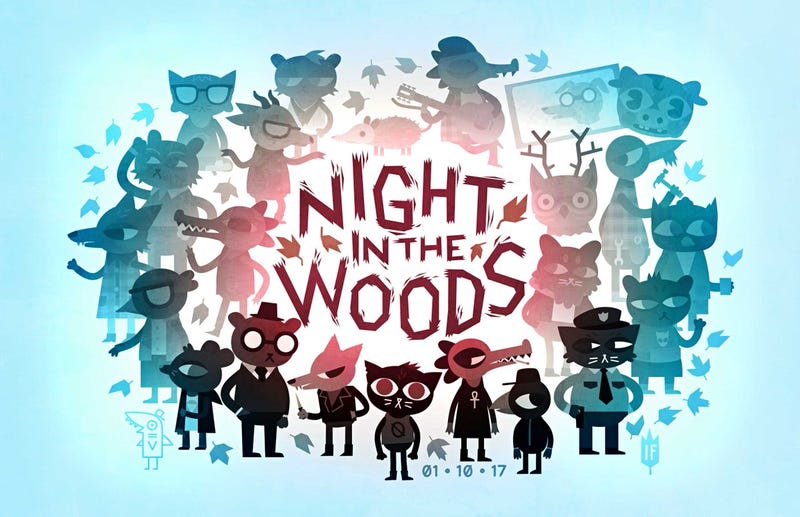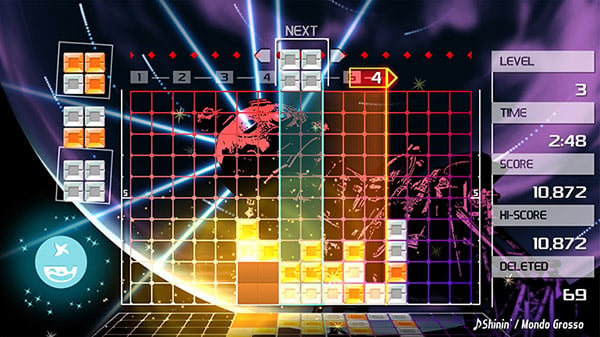Throughout the next few weeks, I'd really like to start writing in depth reviews and analysis/think pieces on some of my favorite, and in some cases LEAST favorite Switch games in my 30 title collection. (Don't ask how I had the money to get 30 games between Christmas and Disney World and still manage to have an epic Disney trip with plenty of cash to burn, haha)
I'm going to start this series with Night in the Woods as promised. To kick things off, let's have some music. Hit it, guys!
Some might view Night in the Woods as pretenious, and in some cases the game REEKS of pretension and has a Hipster "middle finger to society" attititude about it that at first glance can easily be looked at as millenial trash. Underneath the hood though, while gameplay for Night in the Woods might be incredibly simplistic and boarderline impossible to actually loose in, the story, characters, and rich world building connected to powerful heavy hitting themes like nostalgia, mental illness, and transitioning from childhood to adulthood...Night in the Woods has those in spades, and the themes are mostly what I want to explore here.
I'd like to think I have my life "together". Yea I'm still living at home as are a huge chunk of people my age (thanks, housing crash!) but I have a steady job, I pay my own bills, I have a bank account, I have a comfortable amount of money put aside for emergencies. I actually like my job and the people I work with. All in all things are going pretty steady. Before getting said job however, let's just say my life was a lot more like that of aimless protagonist Mae Borowski. It's the relatability that will make or break the game for you. Many view Mae as a spoiled brat who remains unlikable throughout the narrative. I view Mae in a much more personal way.

20 year old recent college drop out Mae Borowski, star player of Night in the Woods, does NOT have her life together in the slightest. After a traumatic incident in her teen years landed her parents in financial ruins and gave her name and face a not-so-flattering reputation among the dwindling population of Possum Springs. Mae's parents though loving and supportive as any good parents should be, are in hardcore "not mad, just disappointed" mode after Mae throws away pressumably her parents life savings upon leaving the school they worked so hard to get her into to escape her muddied past in Possum Springs.
Throughout the game, it's clear the last thing Mae wants to do is escape Possum Springs, a town so rich and vibrant in visual details and backstory that it quickly becomes a character in the narrative in its own right. Mae craves the familarity of home for what at the start of the game seem like incredibly selfish reasons but will soon become tragically agreeable as we get more and more into our heroine's mental state as the game progresses.
Mae wants to do one thing and one thing only...hang out with her friends. These friends quickly become the heart and soul of the game, and Mae's support system for a variety of reasons. There's a yin and a yang here. On the yin side of things is the gay couple of Gregg the fox and Angus the bear. These two are adorable together and absolutely transcend gender stereotypes. Greg in particular is a strong character with a manic sense of energy. He acts as the story's comic relief for most of the run time of the game until the mental weight he bears is revealed late in the gang. Angus acts as a "friend of a friend" that Mae gets closer to as the narrative goes on, and there's some moments between the two of them that are truly heartwarming...particularly a bonding moment late in the game involving star gazing.

On the other side of the coin is Mae's former girl scouts bestie Bea Santello, a cynical, chain smoking lizard taking on the burden of the family business after her mother's unexpected death. (You'll soon come to find every character in the narrative has a tragic weight to bear) Bea's role in the story is tough love. She's a friend who truly cares about Mae and is utterly protective of her in potentially askew social situations, but will be the first to call Mae on her BS especially when it comes to Mae's inability to find a direction in her life...something that Bea's been saddled into by being forced to work seven days a week at her family business. Bea and Mae's scenes together always have an air of meloncholy sprinkled with girlhood glee, such as a moment early in the game where Mae triggers a mall fountain to soak the patrons walking by, something that equally amuses Bea and sets off her immaturity radar.

The game is FILLED with these types of moments. In fact, if I were to describe the gameplay which I've talked very little about here...I'd basically describe it as a zen rock garden version of Nintendo's flagship Wario Ware game. The game has you doing day to day stuff like putting up posters, going to band practice, dancing at a party, poking things with sticks, all of which are activities that cannot be failed. The game holds your hand through the narrative and the only section that offers challenge are the bizarre dreamscapes of Mae's nightmares you must navigate your way through at the end of each day "cycle". Fun platformer physics like jumping and climbing on telephone wires and jumping into piles of leaves definitely add to the overall flavor of the gameplay, but don't go into Night in the Woods looking for something that's going to challenge you in a traditional sense.
The game DOES challenge you though. I feel like I'm at a perfect place in my life to really take in the core themes this game has to offer. I don't want to go too much into the details of Mae's mental illness as many would consider it an end-game spoiler, suffice to say the game's tagline "At the end of everything...hold on to anything" rings powerful in the closing moments. Mae needs her friends and their stability as much as her friends need her wild streak and ability to look at life in a greater context than jobs and bills.

Without getting into real-life details, Mae and her group of friends bear a striking resemblance to people I used to know. People who at this point I'm so far out of communication with I'd consider them ancient history. But the memory of those people lives on and was struck up in a big way with Night in the Woods. The game is not just about looking at yourself in the mirror, it's about examining the young adult experience as a whole. As Mae and her friends enter their early twenties with a renewed sense of community but a knowing that life will eventually tear them apart, I enter the twilight of my twenties as a respectable man who's made it through some truly harrowing anxiety and depression, and the feeling of NEVER being able to get a job, to come out the stronger person on the other side. At the end of everything, hold on to anything. I truly hope the game's protagonists find a lot to hold on to as they reach my place in life.














